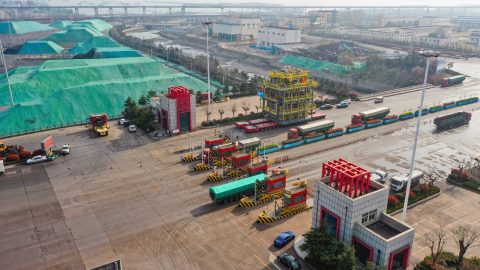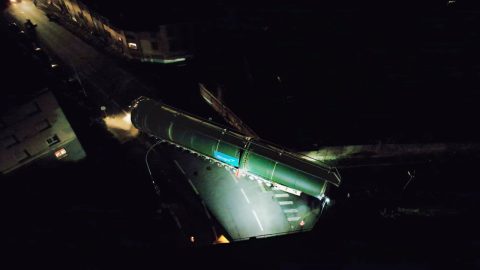German heavy transport woes continue, bordering on full-blown crisis

Heavy transport woes in Germany have continued throughout 2023, bordering on a full-blown crisis. Things are unlikely to change anytime soon unless there is an extensive system overhaul.
Speaking to Project Cargo Journal, Stefanie Schöttle-Christiansen, Head of Wind Renewable Energy, deugro, said that a quick optimisation of the approval process, progress in digitalisation and a reduction in bureaucracy are much needed.
“If rankings and surveys are to be believed, Germany is now 22nd among all UN member states when it comes to the degree of digitalization. This goes beyond just the permitting process for heavy and oversized cargo on German roads,” Schöttle-Christiansen said.
In addition to falling behind with digitalisation, Schöttle-Christiansen added that German authorities have been late in addressing the road, sea and inland port infrastructure issues. “There is almost a tragic comedy in the fact that oversized and heavy transports are essential for the maintenance of roads and bridges,” Schöttle-Christiansen remarked.
The burning issue
But what is the exact issue with the permitting process? Mostly it revolves around the fact that the bureaucracy is overcomplicated and slow, resulting in drawn-out processes. It is hard to put an exact time frame for the permitting process as it depends on the case, according to Schöttle-Christiansen. “How long the process takes depends, among other things, on the dimensions and total weight of the transport, in which German federal state the application is submitted, how many federal states must be heard, to what extent the Autobahn GmbH and which branch of the Autobahn GmbH is involved, etc.”
deugro had its fair share of struggles with the permitting process, with a recent case seeing the company apply for a permit in mid-July and receiving it at the end of October. It was not unusual for the permits to be issued only when the requested period of validity had almost expired, despite the timely submission of an application. The company also had some of its applications denied.
“Unfortunately, the rules for GST (Großraum- und SchwerTransport/Oversized and Heavy Transport) in Germany are not regulated uniformly at the federal level. In addition, according to my information, there is the same shortage of personnel in the authorities’ offices as in the private sector, and since the application must be heard by different offices in each German federal state that the cargo passes through, this, of course, takes longer,” Schöttle-Christiansen said.
In addition, without digitalisation, clear rules and less bureaucracy, it would become even harder for the authorities’ staff to handle all the applications on time. Furthermore, Germany has not created any heavy-duty corridors, and the lack of digitalisation means that construction sites could block transport without the knowledge of a company, despite having a valid permit.
Finding the alternative
German authorities have recently started pushing for more project cargo to move from the roads onto the inland waterways, especially the massive wind turbine components. As part of the Federal Ministry of Transport’s “Master Plan for Inland Shipping”, the inland shipping association (The Bundesverband der Deutschen Binnenschifffahrt eV-BDB) already called for more oversized and heavy goods to be shifted to this mode of transport.
Schöttle-Christiansen adds that there are calls for alternatives such as rail as well, however, together with inland waterways, these modes of transport face their limitations. The size of components transported restricts rail. Inland waterways are hampered by low or high water levels, capacities in the inland port, technical feasibility in the inland port or exit from the inland port to public roads. This means that each of these options has to be considered on a case-by-case basis.
In a best-case scenario, using rail or inland waterways requires companies like deugro to only apply for a permit for the last mile. “This allows us to get closer to the destinations and, as I said, this must be checked very carefully on case by case. All factors must be considered so that there are no delays, which can have an immense economic effect,” Schöttle-Christiansen said.
All the mentioned factors have a significant effect on businesses, transport companies, forwarders and all economic sectors, with eventually the end client feeling the brunt. “Looking at offshore wind specifically, with roughly ten to 16 transports per turbine with some components over 90 metres long, width of 4.3 metres or 4.5 metres high and 150 tons total weight, we are regularly asked by our clients to find alternative and innovative transport solutions,” Schöttle-Christiansen adds,
Solution for German heavy transport permit conundrum
A key issue in the whole permitting process for heavy transport in Germany is communication, as seen by Schöttle-Christiansen. Some permits are denied without giving a reason, and the applicant is left without a chance to address the issue, get explanations or find a solution together with the authorities.
The German association of heavy-lift logistics has already put forward certain demands that could solve the issue. These include calls for the standardisation of rules for heavy and oversized transports across Germany, stabilisation of the dialogue between the German federal and state governments, Autobahn GmbH and VEMAGS, improvement of the approval procedures as well as more clarity, digitalisation of VEMAGS, the application form for oversized and heavy transports, standardisation of fees for permits and the establishment of corridors for heavy and oversized transport.
These demands have also been endorsed by Schöttle-Christiansen who calls for the continuation of the dialogue with the associations and experts, stressing that communication is key!




